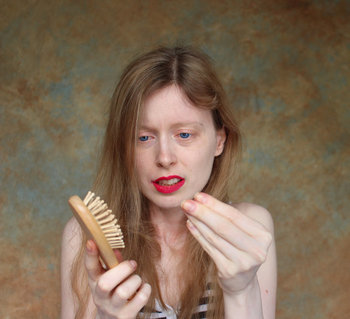 Men aren’t the only ones who are prone to lose their hair; it’s a dirty little secret among women too. Losing strands of hair at lightning speed is something no one wants to talk about because it’s embarrassing and frankly, pretty scary. When it comes to thinning hair, there are many things that can contribute to the phenomenon. Here are some of the most common culprits.
Men aren’t the only ones who are prone to lose their hair; it’s a dirty little secret among women too. Losing strands of hair at lightning speed is something no one wants to talk about because it’s embarrassing and frankly, pretty scary. When it comes to thinning hair, there are many things that can contribute to the phenomenon. Here are some of the most common culprits.
Not Enough Protein
Protein is the foundational building block of your hair. When you don’t get enough of this nutrient in your diet, your hair will pay the price. Being protein-deficient can stunt your hair growth because your body is forced to ration this substance in an effort to support more important functions. Under normal circumstances, women need about 46 grams of protein each day. The Institute of Medicine suggests getting at least 10 percent, but not more than 35 percent of your daily caloric intake should be from protein.
You can beef up your protein levels by eating more fish, chicken, eggs, lean meats, beans and nuts. Rice and hemp protein powders are also viable options. These types of powders tend to be popular among vegetarians and vegans.
Becoming Pregnant
Pregnancy is a beautiful thing, but it can certainly take a toll on your body. The hormone shifts combined with the physical stress of pregnancy are a recipe for thinning hair. This type of hair loss is often more noticeable after giving birth. The good news is that with proper care, your hair will eventually return to its full, lustrous thunder.
Physical Stress
When the body goes through trauma, it can trigger what the medical community refers to as effluvium. Too much physical stress can devastate the hair and cause it to shed like nobody’s business. This condition can be triggered by surgery, loss of a loved one, accidents and severe weight loss. You may not notice the hair loss immediately, but after about six months, there will be no denying that your tresses are thinning.
Iron-deficient Anemia
Anemia in women is extremely common. The most recognizable symptoms are dizziness, fatigue, headaches, and cold hands and feet. This condition, however, can also cause your hair to fall out. Anemia is easy to diagnose via a blood test from a physician. If you are found to be anemic, eating more iron-rich foods such as lean meats, liver, poultry, fish and dark leafy greens such as spinach can help.
Vitamin A Overkill
No doubt, vitamin A is a crucial part of maintaining healthy hair, but when it is taken in excess, it can impede hair growth and lead to thinning and increased hair loss. Vitamin A is fat-soluble, so when you take supplements and eat too many foods that are rich in this nutrient, it can collect in your body and have serious side effects. If you suspect you are overdoing the vitamin A, cut back on carrots, fish oil, sweet potatoes and other foods that are overflowing with this nutrient.
Changing Birth Control Procedures
If you switch birth control pills, one of the side effects may be shedding hair. This is because changing pills can knock your hormones out of whack and prompt thinning hair. Increased hair loss from changing your birth control pills is more likely to happen if you have a family history of thinning hair.
Hair loss is something many women just don’t want to talk about or acknowledge. This issue is nothing to be ashamed of as it can happen to the healthiest of women – even when you are meticulous with your hair care routine. With a little time and patience though, hair loss caused by most of the most issues listed above is reversible.
To learn more, visit Keranique, on Amazon.

